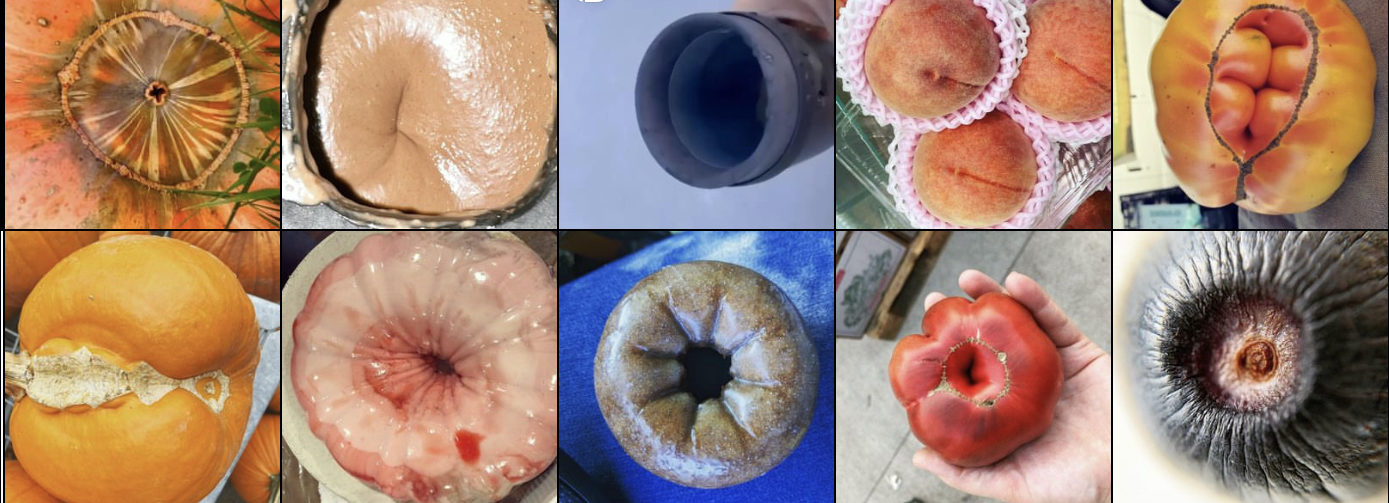
anal (adj.)
@secret_buttholes instagram
Share:
Most men, I’ve read, never see their own anuses, let alone other for-them-unthinkable verbs. My approach to the root chakra deviates from such aversion. Although the alimentary terminus has fascinated me since childhood, the most striking image of it I know is one I never saw but, instead, had described to me by a friend in college. He conjured a reductio ad absurdum of human corporeality that he dubbed a “meat doughnut”: a hoop suspended in an imaginary plane parallel to the ground; pour food into the top of the hoop and what falls to the ground are feces. What I admire most about this somewhat Cronenbergian notion is the simplicity with which it rethinks a whole person as a person hole.
Compare these two extremes, the real and the fanciful, and consider the gulf between the two. What a huge swath of humanity views (or … doesn’t) as unmentionable/unseeable is, nonetheless, a portal of metamorphosis, a gateway to the zone of the abject. Think of it as the body’s prestidigitator, whose daily show entails the disappearance of entire meals, often before an audience of none. Like a stage magician, the human anus is a sly performer that divulges its secrets unwillingly, if at all. Other primates lack the prominent nates that typically hide our terminal sphincter. The narrator of Chris Leo’s 2004 novel, White Pigeons, speculates that natural selection and a desire at a late stage in pre-human sex to cover up what clung to the hindmost opening gave us the rumps that our cousins do without. Leo’s lengthy and probably nonsensical—but certainly memorable—hypothesis concludes, of males: “We made that ass.” The likelier explanation, that walking upright, versus doing so on all fours, was to blame for the buttocks? Nowhere near as much fun.
Whatever the evolutionary-biology explanation may be, once the ass sent the asshole into hiding, that source of mephitic aromas and unfortunate effluvia gained an air of mystery. Thus, leaping ahead maybe an epoch or so, we get the euphemism blind cheeks and a wry Irish corollary that, according to Playboy’s Book of Forbidden Words (1972), went, “I’ll give him a hit where it won’t blind him … meaning ‘I’ll kick his arse.’” Lyndon Baines Johnson called the end of his digestive tract a “bunghole,” a term derived from that for a stopper in a cask. The 36th US president reputedly had installed in the White House a multiple-jet shower, one outlet of which spouted upward from below for purposes I surely needn’t detail. People (I’m not naming any names) for whom anal euphemisms are beside the point, though, regard the lowliest orifice, simultaneously, as the highest of holies: the pathway to the most numerous, intense, and prolonged of orgasms.
Or so I’ve said.
Edward Austin Hall co-created Hunter: The Reckoning in 1999 for White Wolf Game Studio and recently contributed to that roleplaying game’s new fifth edition; his game writing also appears in Blackbirds (Andrews McMeel, 2022). He co-edited the 2013 anthology Mothership: Tales from Afrofuturism and Beyond, a book acknowledged in a front-page NPR.org story headlined “Sci-Fi Has Changed A Lot In The Past Decade—These 7 Reads Will Show You How.” Gumbohaus published Dread Isle, Hall’s first novel, in 2020. His new novelette, Green Treacheries, appears in a just-released anthology of Atlanta-set fantastical fictions called Terminus 2.